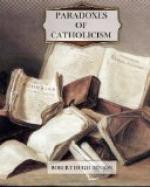Once more, then, we appear to be in the wrong, to whatever side we turn. The happy red-faced monk with his barrel of beer is a caricature of our joy. Can this, it is asked, be a follower of the Man of Sorrows? And the long-faced ascetic with his eyes turned up to heaven is the world’s conception of our sorrow. Catholic joy and Catholic sorrow are alike too ardent and extreme for a world that delights in moderation in both sorrow and joy—a little melancholy, but not too much; a little cheerfulness, but not excessive.
II. First, then, it is interesting to remember that these charges are not now being made against us for the first time. In the days even of the Roman Empire they were thought to be signs of Christian inhumanity. “These Christians,” it was said, “must surely be bewitched. See how they laugh at the rack and the whip and go to the arena as to a bridal bed! See how Lawrence jests upon his gridiron.” And yet again, “They must be bewitched, because of their morbidity and their love of darkness, the enemies of joy and human mirth and common pleasure. In either case they are not true men at all.” Their extravagance of joy when others would be weeping, and their extravagance of sorrow when all the world is glad—these are the very signs to which their enemies appealed as proofs that a power other than that of this world was inspiring them, as proofs that they could not be the simple friends of the human race that they dared to pretend.
It is even more interesting to remember that our Divine Lord Himself calls attention to these charges. “The Son of Man comes eating and drinking. The Son of Man sits at the wedding feast at Cana and at meat in the rich man’s house and you say, Behold a glutton and a winebibber! The Son of Man comes rejoicing and you bid Him to be sad. And John the Baptist came neither eating nor drinking. John the Baptist comes from the desert, an ascetic with his camel-hair about him and words of penance and wrath in his mouth, and you say, He hath a devil.... We have piped unto you and you have not danced. We have played at weddings like children in a market-place, and you have told us to be quiet and think about our sins. We have mourned unto you, we have asked you to play at funerals instead, and you have told us that it was morbid to think about death. We have mourned and you would not lament.”
III. The fact is, of course, that both joy and sorrow must be an element in all religion, since joy and sorrow together make up experience. The world is neither white with black spots nor black with white spots; it is black and white. It is quite as true that autumn follows summer as that spring follows winter. It is no less true that life arises out of death than that death follows life.




